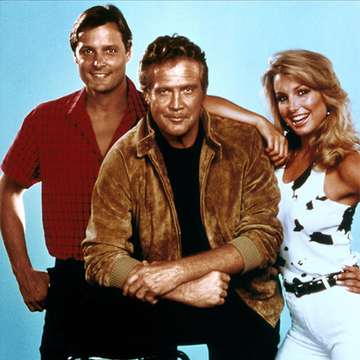On Saturday, Uma Thurman revealed her personal history with Harvey Weinstein. In an account written by Maureen Dowd f0r The New York Times, the actress—whom Weinstein once introduced to President Barack Obama "as the reason he had his house"—claimed that the film producer allegedly sexually harassed and sexually assaulted her (two uncomfortable encounters, the first taking place in Paris and the second not long after in London).
Thurman, who earned an Oscar nomination for her role in Quentin Tarantino's Pulp Fiction, the film that made Weinstein a Hollywood power player, claimed that following the alleged attack, the producer "threatened to derail her career." (Weinstein has denied Thurman's allegations of sexual assault, saying through a representative that the producer and actress had "a flirtatious and fun working relationship.")
Many of us who have followed (and written about) the Weinstein saga and the larger fallout have been waiting for Thurman's version of events ever since she gave a chilling answer to a reporter who asked her in October about the numerous women who had accused Weinstein of sexual assault and harassment. Thurman, after all, was one of the Miramax darlings; her performance in Pulp Fiction arguably made her a star, and her later role in Kill Bill Vol. 1 and 2 established her as a fierce action superstar, the face of an empowering revenge tale and the muse of one of our great contemporary cinematic auteurs.
And yet behind the scenes, Thurman was also a victim—and not just at the hands of the infamous producer who has come to symbolise all of Hollywood's dark blemishes. Thurman's story also reveals, once again, how men in Hollywood often manipulate and abuse their female counterparts under the misogynistic guise of genius.
Thurman's revelations in The New York Times do not stop at Weinstein, as she also reveals a disturbing incident on the set of Kill Bill in Mexico. With four days left in production, Tarantino directed her to drive in a stunt car for the now-iconic scene in which The Bride delivers a searing monologue laying out her plan for vengeance against the man who has wronged her. A teamster on set, however, warned her that the car might be unsteady; she raised her objections, asking that a trained stunt performer shoot the scene in her place. Tarantino, Thurman has alleged, was livid.
"Quentin came in my trailer and didn’t like to hear no, like any director," she told the Times. "He was furious because I’d cost them a lot of time. But I was scared. He said: 'I promise you the car is fine. It’s a straight piece of road.'"
Raw footage from the production, which Thurman eventually obtained from Miramax and has been published by the Times, depicts the car crashing within minutes after the cameras began rolling. Thurman claims the crash left her with a concussion, permanent neck damage, and "screwed-up knees." The incident was also a major betrayal from someone whom the actress considered a trusted collaborator and friend.
"Quentin and I had an enormous fight, and I accused him of trying to kill me," she said. "And he was very angry at that, I guess understandably, because he didn’t feel he had tried to kill me."
Thurman's accounts of her working relationship with Tarantino also serve as a betrayal to his fans, as well. Tarantino is an inarguably controversial director. His films are hyper-violent; his characters toss around racial epithets with whimsy; female characters, in particular, receive the brunt of the on-screen violence.
His films also spark nuanced criticism. His revenge tales, in particular, depict marginalised figures fighting back—and defeating—powerful white men. In his cinematic universe, everyone has the opportunity to commit evil, yet retribution and redemption are usually achieved by female and black characters.
But the artist behind these stories may not treat his real life peers and collaborators with the same respect and humanity he does his fictional creations. The account of the car crash in Kill Bill is just one of the disturbing behaviours that Thurman reveals. According to Thurman, Tarantino stepped in for Michael Madsen when the character of Budd spits on the Bride's face. When time came on set for Chiaki Kuriyama's giddy Japanese schoolgirl Gogo Yubari to choke Thurman with a chain, Tarantino did it himself.
Diane Kruger, who played Bridget von Hammersmark in Inglourious Basterds, told Parade Magazine in 2009 that Tarantino's hands are visible in the close-up shot when her character is strangled to death. "I have to say it was very strange being strangled by the director," she said.
I've long been a Quentin Tarantino fan. And I've seen the disturbing images in his films as commentary on the world's horrors rather than celebration, particularly because the characters who commit those horrendous acts ultimately see their comeuppance in his films' final moments. I've been willing to overlook the messiness of his worldview—the gratuitous violence, the racist language. As a critic and a viewer, I compartmentalise what I see; I process it and contextualise it. When what happens behind the camera is unknown to us, it's extremely easy to give a film director the benefit of the doubt.
Yet what Thurman alleges she experienced on set has changed my mind. Take, for example, how the car crash on the set of Kill Bill seemingly inspired Tarantino's follow-up: In Death Proof, a crazed movie stuntman played by Kurt Russell stalks and brutally murders five young women (including a character played by Weinstein accuser Rose McGowan) with his vehicle.
In the second half of the film, his attempts to pull the same game against three women (including a character played by Zoe Bell, Thurman's Kill Bill stunt double and a dead-ringer for the actress) sees the tables being turned and Russell's Stuntman Mike torn to pieces by the women he pursued. What was originally a tense, violent, high-speed thriller now feels like Tarantino's sorry excuse as a cinematic mea culpa, a trashy and exploitative version of an apology for betraying his female colleague's trust in pursuit of artistic truth. I mean, fuck that.
I have to ask: How many other uncomfortable moments of brutality and disrespect seen in Tarantino's films were equally inspired by real-life experience? When is on-screen violence not just a commentary, but a sadistic celebration? How can I possibly watch a Tarantino film without avoiding these questions, without jumping through hoops to compartmentalise the art from the artist—what has now, less than six months since Harvey Weinstein's accusers kicked open the door to reveal Hollywood's dark secrets, turned into cliched philosophical gymnastics?
I cannot tell you never to watch Quentin Tarantino's films again. I can't suggest that the director no longer make them. But I am ready to admit that I'm tired of having to raise these questions over and over and over again. There has come a time to actually question the values we expect in others—not just those we hold close to us, but also the people who make the entertainment we consume, appreciate, and hold up as the artistic standard.
I am tired of hearing stories like Thurman's.
I am tired of learning that the women we admire and cherish as public figures have been forced to carry private burdens.
I am tired of knowing, full well, that men in Hollywood have manipulated and abused women on and off screens for decades—and that most of us respond to those unsurprising revelations by rationalising these abusers' behaviour instead of holding them accountable.
Uma Thurman is angry. I am angry, too.
UPDATE: Today, Uma Thurman posted the footage of the car crash that took place on the set of Kill Bill to her Instagram account, along with the following caption: "Quentin Tarantino was deeply regretful and remains remorseful about this sorry event, and gave me the footage years later so I could expose it and let it see the light of day, regardless of it most likely being an event for which justice will never be possible. He also did so with full knowledge it could cause him personal harm, and i am proud of him for doing the right thing and for his courage. THE COVER UP after the fact is UNFORGIVABLE. For this I hold Lawrence Bender, E. Bennett Walsh, and the notorious Harvey Weinstein solely responsible. They lied, destroyed evidence, and continue to lie about the permanent harm they caused and then chose to suppress."
Tyler Coates is the Senior Culture Editor at Esquire.com. He lives in Los Angeles.














